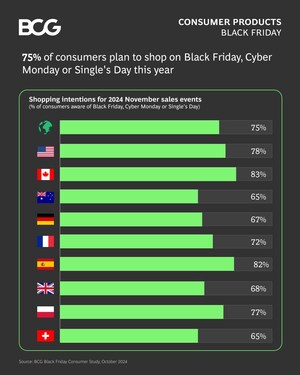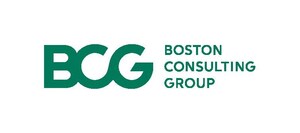- CO2 AI and BCG's Third Annual Carbon Emissions Survey Indicates Companies Are Falling Short on Reduction Ambitions, Citing a Wide Array of Challenges
- Companies Have Significantly Improved Partial Measurement and Reporting of Scope 3 Emissions—Up 19 Percentage Points Since 2021, From 34% to 53%
- Asia Pacific Respondents Improved Comprehensive Emissions Reporting by 7 Percentage Points (PP) Since 2021; South American and North American Respondents Improved Scopes 1 and 2 Emissions Reporting By 9 PP Points and 5 PP, Respectively
- When Asked to Quantify Decarbonization, 40% of Survey Respondents Estimate an Annual Benefit of at Least $100 Million to Their Business
- Within the Next Three Years; 30% of Companies Plan to Expand the Deployment of AI-Powered Tools to Improve Accuracy, Efficiency, and Decision-Making in Emissions Management
BOSTON, Nov. 16, 2023 /PRNewswire/ -- As climate-related disasters intensify in frequency and severity, so does the economic impact on communities and businesses. Despite a responsibility to mitigate the crisis with emissions reductions in their operations and supply chains, companies have not made much progress in comprehensively measuring and reducing their emissions over the past year, according to a new study by CO2 AI and Boston Consulting Group (BCG) being released ahead of COP28, which begins at the end of the month.
Titled Why Some Companies Are Ahead in the Race to Net Zero, the study builds on CO2 AI and BCG's 2021 and 2022 investigations into the progress that businesses around the world have made on emissions measurement and reduction. CO2 AI and BCG surveyed 1,850 executives responsible for emissions measurement, reporting, and reduction in their organizations across 18 major industries and 23 countries. Each organization surveyed had at least 1,000 employees and annual revenues ranging from $100 million to over $10 billion.
"There are encouraging signs of progress in measuring and reducing emissions, but it is crucial that businesses redouble their efforts," said Hubertus Meinecke, BCG's global sustainability leader and a coauthor of the study. "Doing so will not only help mitigate the impacts of climate change, but it will also deliver a boost to businesses' bottom lines."
Progress on Comprehensive Emissions Measurement Remains Slow
According to the survey, just 10% of companies now report comprehensively measuring all their emissions, revealing no improvement relative to the 2022 survey. More concerning, only 14% of companies report reducing emissions in line with their ambitions over the past five years, down 3 pp from 2022, citing difficult economic conditions and capital constraints as challenges to their reduction efforts.
However, companies that have made decarbonization progress are realizing both financial and non-financial benefits to their business, citing reputational value, lower operating costs, and regulatory compliance among the top benefits. When asked to quantify, 40% of respondents estimate an annual financial benefit of at least $100 million from meeting emissions reduction targets, a 3 pp increase compared with last year's survey.
An Improvement in Scope 3 Emissions Measurement
The number of respondents indicating partial measurement and reporting of Scope 3 emissions has increased by 19 pp since 2021, from 34% to 53%. In tandem, more respondents said they have set Scope 3 reduction targets—up 12 pp since 2021, from 23% to 35%—with the most common areas of focus being waste management and purchased goods and services.
Some regions have demonstrated clear improvement in comprehensive measurement of emissions in the past two years. Asia Pacific respondents improved comprehensive reporting of Scope 1 (direct emissions from company-owned and controlled resources), 2 (indirect emissions from the generation of purchased energy that an organization consumes), and 3 (indirect emissions that occur in the value chain of a company, including both upstream and downstream missions) emissions by 7 pp since 2021. The number of South American and North American respondents improved comprehensively reporting their internal emissions, Scopes 1 and 2, by 9 pp and 5 pp, respectively.
Four Traits of Companies Reducing Emissions in Line with Ambitions
Companies that report reducing their emissions in line with their ambitions were found to display four notable traits more strongly:
- Collaborating with suppliers and customers on emissions measurement and reduction: 75% of companies that reduced emissions in line with their ambition have joint reduction initiatives with most of their suppliers, and 54% have similar initiatives with most of their customers.
- Calculating emissions at the product level: The survey found that 75% of companies attempt to calculate emissions for at least some of their products "from cradle to gate," that is, from raw materials to distribution.
- Harnessing the power of digital technology in the emissions-management process: Companies with automated digital solutions for measurement are 2.5 times more likely to measure their emissions comprehensively. In addition, 30% of companies plan to expand the deployment of AI-powered tools within the next three years to improve accuracy, efficiency, and decision-making in emissions management.
- Viewing Regulations Positively: They are 2.0 times more likely to view emissions-reporting regulations to be a key enabler of reduction.
"Businesses are increasingly acknowledging the transformative power of technologies and artificial intelligence in bridging the divide between their reduction ambitions and real, tangible impact," said Charlotte Degot, CEO and Founder of CO2 AI and a coauthor of the report. "There is no time to lose in scaling these best practices."
Download the publication here:
https://www.bcg.com/publications/2023/why-some-companies-are-ahead-in-the-race-to-net-zero-and-reducing-emssions
Media Contacts:
Eric Gregoire:
+1 617 850 3783
[email protected]
Camille Richaud:
+33 7 77 75 91 29
[email protected]
About Boston Consulting Group
Boston Consulting Group partners with leaders in business and society to tackle their most important challenges and capture their greatest opportunities. BCG was the pioneer in business strategy when it was founded in 1963. Today, we work closely with clients to embrace a transformational approach aimed at benefiting all stakeholders—empowering organizations to grow, build sustainable competitive advantage, and drive positive societal impact.
Our diverse, global teams bring deep industry and functional expertise and a range of perspectives that question the status quo and spark change. BCG delivers solutions through leading-edge management consulting, technology and design, and corporate and digital ventures. We work in a uniquely collaborative model across the firm and throughout all levels of the client organization, fueled by the goal of helping our clients thrive and enabling them to make the world a better place.
ABOUT CO2 AI
CO2 AI is the leading end-to-end sustainability management solution that empowers large and complex organizations to achieve their sustainability goals.
By leveraging the power of Artificial Intelligence, CO2 AI's solution offers businesses a single software suite to accurately and efficiently measure their carbon footprint, execute decarbonization initiatives and report their emissions complying with regulations.
Building on previous investments by BCG, CO2 AI is an independent company headquartered in Paris with international presence.
Visit https://co2ai.com/ to put sustainability into action.
SOURCE Boston Consulting Group (BCG)

WANT YOUR COMPANY'S NEWS FEATURED ON PRNEWSWIRE.COM?
Newsrooms &
Influencers
Digital Media
Outlets
Journalists
Opted In





Share this article